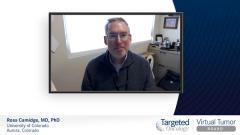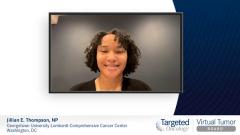
Overview on ALK+ Metastatic Non–Small Cell Lung Cancer
Expert panelists open their discussion on ALK+ non–small cell lung cancer and reflect on the impact of CNS metastasis in this setting.
Episodes in this series

Transcript:
Stephen Liu, MD: Hello and welcome to this Targeted Oncology™ Virtual Tumor Board® focused on the diagnosis and treatment of ALK-positive metastatic non–small cell lung cancer. My name is Dr Stephen Liu, associate professor of medicine and director of thoracic oncology at Lombardi Comprehensive Cancer Center at Georgetown University [Washington, DC]. I am joined by a panel of experts in lung cancer for our discussion. First, from Northwestern University [Chicago, Illinois], Dr Jyoti Patel.
Jyoti Patel, MD: Hi, thank you so much for this invitation. I’m a professor of medicine and associate vice chair of clinical research in the Department of Medicine at Northwestern. [I also] lead the thoracic oncology program.
Stephen Liu, MD: Glad to have you here with us today. From the University of Colorado [Aurora], Dr Ross Camidge.
Ross Camidge, MD, PhD: Hi, Steve. I am the director of thoracic oncology at the University of Colorado Cancer Center, and it’s great to be here.
Stephen Liu, MD: And from Georgetown University, Jillian Thompson.
Jillian E. Thompson, NP: Hello, I’m Jillian Thompson, nurse practitioner at Lombardi Cancer Center. Thank you for having me today.
Stephen Liu, MD: In today’s presentations, my esteemed colleagues and I will provide an overview of ALK+ non–small cell lung cancer and present some clinical cases. We’ll discuss approaches to treating patients with ALK+ non–small cell lung cancer and share our unique perspectives on key clinical trial data that may impact our treatment decisions. Thank you all for joining us today, let’s get started.
When we think about ALK+ lung cancer, we know this is a unique subset of non–small cell lung cancer. We realize lung cancer is not 1 disease, but many diseases, each defined by its own unique genomic alteration. These different genetic changes identified in non–small cell lung cancer define different biologies, and we finally have the ability to treat these different cancers in their own way. We have FDA-approved agents for EGFR-mutated lung cancer, and note, we have different agents approved for different mutations. For KRAS G12C, a relatively common mutation, we now have 2 drugs FDA approved. For cancers harboring fusions in ALK, ROS1, RET, and NTRK, we have FDA-approved agents that are extremely effective. We also have drugs targeting mutations in BRAF, MET exon 14, and in HER2.
In addition, for cancers without a driver alteration, protein expression, or PD-L1 expression, can help guide the use of immunotherapy. It is the responsibility of the medical oncologists to understand these different subsets and tests. Understanding lung cancer is understanding that it is many different diseases. Each needs to be defined. Testing is a critical part of management for non–small cell lung cancer.
Fusions between EML4 most frequently and ALK were found in non–small cell lung cancer. This was the first oncogenic fusion to be targeted in lung cancer. We’ve seen from preclinical work that when we implant that gene fusion into normal cells, that it is enough to transform a normal lung cell into a cancer. Cancer draws strength from [and is] identified by this fusion, but because it relies on that signal, it also represents the unique and specific context of vulnerability, one that we are now able to effectively target.
ALK lung cancer is a unique subset of lung cancer. My colleagues today are among the most experienced in managing this type of lung cancer. Compared to other types of lung cancer, there’s a strong tropism, a strong attraction, to the brain. The brain is a very common site of metastasis. A substantial portion of patients will have brain metastases at the time of diagnosis, and in those with brain metastases at baseline, it’s a very frequent site of progression. In addition, those without brain metastases at diagnosis are unfortunately very likely to develop them over the course of their therapy.
Transcript edited for clarity.










































